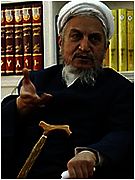Attempts to Eliminate Critical Clergy
» Government: Ayatollah Sanei Not a “Source of Emulation”
Following warnings by the Islamic Passdaran Revolutionary Guards Corps (IRGC) about the “increasing rift between grand ayatollahs and clergy with supreme leader,” and following recent attacks by government supporters on critical grand ayatollahs, yesterday the Qom Seminary Teachers Society announced that it does not regard ayatollah Yousef Sanei as a source of emulation.
The government official news agency wrote on January 2 that the the Qom Seminary Teachers Society has announced in a short letter: “In light of repeated questions by the pious, the Qom Seminary Teachers Society concludes following investigations conducted throughout the year and after holding several meetings that he lacks the necessary qualifications to serve as a source of emulation.”
Meanwhile, ayatollah Sanei’s office announced that because of questions as to whether the majority of the Qom Seminary Teachers Society members agree with the content of the letter, it would not react to it yet. Ayatollah Sanei’s office said that it is awaiting the official publication of the names of members present at the meeting and the clarification of the clerical background of members who questioned ayatollah Sanei’s qualification. In one of the first reactions to the letter ascribed to the Qom Seminary Teachers Society, Qom’s Friday prayer leader, Ayatollah Amini, denied having taken part in any way in the controversy and announced, “Such acts are not beneficial to the seminary school or the religion.”
The letter from the Qom Seminary Teachers Society was signed by Mohammad Yazdi. Prior to the contested presidential election also ayatollah Yazdi had announced that the majority of the Qom Seminary Teachers Society members support Mr. Ahmadinejad’s candidacy, which was objected to by a number of clerics. The objecting clerics argued that all decisions by the Qom Seminary Teachers Society are valid only after having been passed by the vote of two-thirds of the Society’s members, a rule violated with the release of the pro-Ahmadinejad statement.
In 1994, following the death of ayatollah Araki, the Qom Seminary Teachers Society released the names of seven jurists who, in the Society’s view, possessed the necessary qualifications to serve as sources of emulation. That list did not contain the names of ayatollahs Sanei and Montazeri, and for the first time contained the name of ayatollah Khamenei as a source of emulation.
However, this is the first time that the Qom Seminary Teachers Society singles out ayatollah Sanei as lacking the qualifications to serve as a source of emulation. Ayatollah Sanei has been among the clerics who have taken clear and transparent positions in condemnation of the Iranian government’s treatment of opposition protesters since the most recent presidential election in Iran.
He also strongly protested the sham trial of post-election detainees and described the extracting of confessions as an instance of violation the Koran. Mr. Sanei had also defended Mir-Hossein Mousavi.
Simultaneous with the release of the Qom Seminary Teachers Society’s statement, IRNA news agency published a statement by a group of Qom seminary students in support of the statement, denouncing some of ayatollah Sanei’s religious decrees as evidence of his disqualification as a source of emulation. The authors of the statement referred to ayatollah Sanei’s views on the “equality of blood money for men and women” and “prohibition of temporary marriage of a married Muslim man” as against the religion.
IRGC’s Worries
The Qom Seminary Teachers Society released its statement yesterday regarding ayatollah Sanei’s disqualification as a source of emulation while the IRGC had previously warned against the increasing social and political rifts since the election, particularly the increasing “distance between the clergy and the supreme leader.”
Early in December, the website “Basirat,” close to the supreme leader’s office at the IRGC, which addresses “political guides” in this military organization, had emphasized that “differences between “the grand ayatollahs and clergy with supreme leader” can act as “a new threat against the Islamic Republic.”


